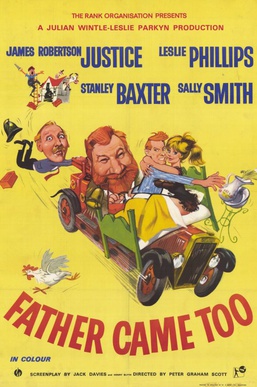Father Came Too!
| Father Came Too! | |
|---|---|
 | |
| Directed by | Peter Graham Scott |
| Written by | Jack Davies Henry Blyth |
| Produced by | Leslie Parkyn Julian Wintle |
| Starring | James Robertson Justice Leslie Phillips Stanley Baxter Sally Smith Ronnie Barker |
| Cinematography | Reginald Wyer |
| Edited by | Tom Priestley |
| Music by | Norrie Paramor |
Production company | |
| Distributed by | J. Arthur Rank Film Distributors |
Release date |
|
Running time | 91 minutes |
| Country | United Kingdom |
| Language | English |
Father Came Too! is a 1964 British comedy film directed by Peter Graham Scott and starring James Robertson Justice, Leslie Phillips and Stanley Baxter.[1] It is a loose sequel to The Fast Lady.[2]
It was produced by the Independent Artists company for distribution by Rank.[1] It was shot at Beaconsfield Studios with sets designed by the art director Harry Pottle.[3][4] The village of Turville in Buckinghamshire was used for filming the pageant scenes.[3] The film's dresses were designed by Julie Harris.[1]
Plot
Dexter (Stanley Baxter) and Juliet (Sally Smith) Munro are a young newly married couple who move to a run-down country cottage in hopes of escaping from Juliet's overbearing father, Sir Beverly Grant (James Robertson Justice). However, the couple is soon confronted by their new home's battered structure. Juliet's father offers help from a reputable building firm, but this help is refused by Dexter, who wants to remain independent of Juliet's father.
Dexter sees an ad in the local paper and employs Josh (Ronnie Barker) to do the work. The house is finished, although well over budget, but eventually burns down because Juliet's father had changed the fuses from 15 amp to 30 amp, causing the fire. Roddy, their estate agent (and aspiring actor) (Leslie Phillips) saves the day, telling Dexter and Juliet that a motorway is soon to be built on their land, so they can sell at a profit, and gives them the keys to a cottage requiring no work in the adjoining field.
Cast
- James Robertson Justice as Sir Beverly Grant
- Leslie Phillips as Roddy Chipfield
- Stanley Baxter as Dexter Munro
- Sally Smith as Juliet Munro
- Eric Barker as Mr. Gallagher
- Kenneth Cope as Ron
- Terry Scott as Executioner
- Hugh Lloyd as Mary, Queen of Scots
- Fred Emney as Sir Francis Drake
- Peter Jones as Charles II
- Ronnie Barker as Josh
- Philip Locke as Stan
- Timothy Bateson as Wally
- Cardew Robinson as Fire Officer
- Peter Woodthorpe as Farmer
- James Villiers as Benzil Bulstrode
- John Bluthal as Robert the Bruce
- Joseph Brady as Guy Fawkes
- Raymond Huntley as Mr. Wedgewood
- Vanda Hudson as Nell Gwynne
- Patrick Newell as King Harold
- Geoffrey Dunn as Mr. Trumper
- Sydney Bromley as Lang
- Julian Orchard as Bath Salesman
- Clifford Earl as Motorcycle Policeman
- Nicky Henson as Motorcyclist
- Barbara Roscoe as Lana
- Anita Sharp-Bolster as Mrs. Trumper
- Arthur Mullard as Traffic Warden
- Michael Ward as Man at Auction
Critical reception
TV Guide noted "A broad British comedy."[5]
Kinematograph Weekly called the film a "money maker" at the British box office for 1964.[6]
References
- ^ a b c "Father Came Too!". BFI. Archived from the original on 14 January 2009.
- ^ "Father Came Too!". www.comedy.co.uk.
- ^ a b "Bot Verification". www.reelstreets.com.
- ^ "Father Came Too (1963) - Peter Graham Scott | Cast and Crew | AllMovie" – via www.allmovie.com.
- ^ "Father Came Too". TVGuide.com.
- ^ Altria, Bill (17 December 1964). "British Films Romp Home - Fill First Five Places". Kinematograph Weekly. p. 9.
External links
- Use dmy dates from April 2016
- Articles with invalid date parameter in template
- Use British English from April 2016
- Articles with short description
- Template film date with 1 release date
- IMDb title ID not in Wikidata
- British sequel films
- 1964 films
- 1964 comedy films
- British comedy films
- Cultural depictions of Charles II of England
- Cultural depictions of Francis Drake
- Cultural depictions of Guy Fawkes
- Cultural depictions of Mary, Queen of Scots
- Films shot in Buckinghamshire
- 1960s English-language films
- 1960s British films